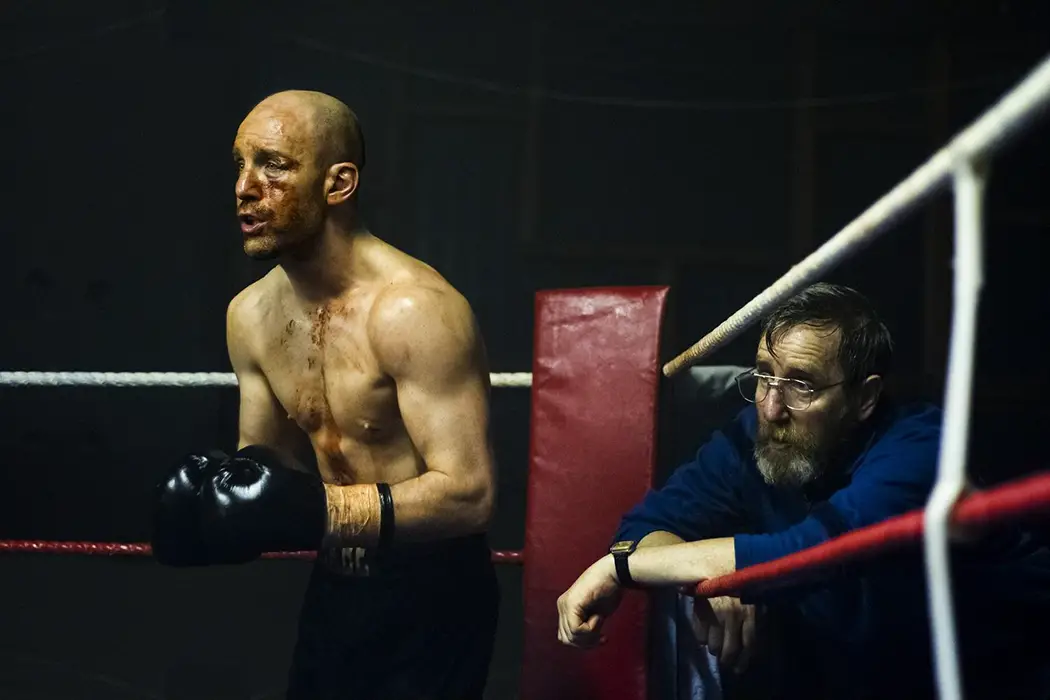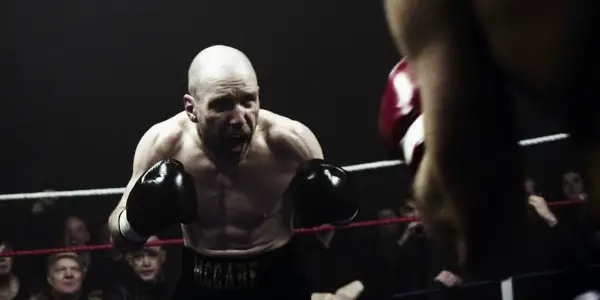JAWBONE: Breathes New Life Into the Stale Boxing Drama Genre

Alistair is a 25 year old writer based in Cambridge.…
Is there any dramatic narrative more likely to provoke utter indifference among audiences than the boxing drama? Ever since Rocky and Raging Bull portrayed the authentic, unglamorous grit of the people whose reason d’être can be found inside the ring, films in this mould have stuck so close to the standard narrative beats that they’ve managed to transform what was once hard hitting and compelling into one of the most clichéd sub-genres in existence.
Both rags to riches and riches to rags stories follow the template of these two genre totems, occasionally delivering a knockout blow to the influence of Rocky, yet never managing to defeat the heavyweight champion that is Martin Scorsese’s early ’80s masterpiece.
Fresh yet familiar
Because of this reliance on familiarity, it is easy to roll your eyes whenever a new boxing movie is released. Yet on the arthouse fringes, boxing movies are getting their mojo back; deadpan Finnish comedy The Happiest Day in the Life of Olli Maki managed to KO all competition in last year’s Un Certain Regard competition in Cannes, while brand new British indie Jawbone manages to revitalise the genre in a more straightforward manner. It is narratively familiar, yet presents an unrelenting form of social realism that strips the genre of its clichés and makes it feel urgent once again.

Without sounding too dismissive, the simplest way of describing Jawbone is Raging Bull meets I, Daniel Blake. Johnny Harris, who also wrote the screenplay, stars as former child boxing champion Jimmy McCabe, a man whose alcohol addiction has robbed him of dignity, with his peers looking down upon him as somebody whose poor life choices have robbed them of the likely chance they were going to become a great athlete.
We are introduced to Jimmy living on the fringes of society; thrown out of his home, refused benefits payments and resigned to squatting in the gym where he had trained all those years ago. Instead of crying for help, he tries to hold onto any morsel of pride he has left; going hungry yet trying to avoid asking for food, homeless yet avoiding asking the people in his life for a bed to spend the night, attending AA meetings yet refusing to speak, as doing so would confirm the downward trajectory his life has sharply taken.
Upon re-arrival at the boxing gym where he used to train, he is treated like a ghost by people who deeply care about him, yet don’t want to get close if he falls back onto a self-destructive path. Played by Ray Winstone and Michael Smiley, both of whom are delivering some of their most admirably restrained work in years, it is clear their anger and frustration comes from a place of love. Somebody they have respected has thrown their life away and has only chosen to revisit their talent as soon as all their skills have vanished from their grasp – a fact that is never mentioned, yet the mournful sadness of this hangs omnipresent over each and every scene.
Character over style
In its third act, the film naturally forgoes the tender character study in favour of a more recognisable underdog narrative – yet here, the boxing match isn’t in front of a stadium of thousands, but a tiny audience whose screams appear deafening even though their number is minute. This may be the only misstep in an accomplished work of realism, as somebody in post production has clearly added the sound of a cheering stadium audience into the mix, which becomes hard to ignore once noticed.

The reason it is so jarring is because up until this moment, this has been a keenly realised character study that has effectively got under the skin of a protagonist who now spends his life hiding from himself and the world at large. It doesn’t deserve the faux-grandiosity attempting to be awarded to it.
The realism isn’t just due to the stripped down, handheld style of debutant director Thomas Napper, a second unit director best known for his highly stylised work with Joe Wright and Disney’s recent live action fairytales – which couldn’t be further from this in terms of style. In fact, the film is almost entirely anchored by the quiet, brooding strength of Johnny Harris’ lead performance. Jawbone is the sort of film that doesn’t need to rely on exposition, because the pain of past mistakes are all telegraphed in even the smallest of facial expressions.
When internal anxieties irrupt into uncontrollable anger, Napper stages these sequences in a chaotic manner. Like his failure to repeat past glories in the ring, his explosions of verbal and physical violence are characterised by putting emotion in front of action – the thought he previously put into his choreography replaced by a subconscious desire to fight back against a society that has left him entirely on the margins. This is portrayed visually by a seemingly abrupt switch to fast cuts and shakier angles, deliberately losing a tighter control of the shot in order to accurately channel the unfocused rage so integral to Harris’ performance.
Conclusion
For a director who has made a name working on productions defined by their style, making a debut film stripped entirely of distracting aesthetic elements appears to be cathartic. Focusing entirely on the strengths of his performances has ensured that Napper may soon be a name to be mentioned on his own terms, not just in the context of other filmmaker’s careers – being able to get his cast to deliver quietly excellent performances like this surely pegs him as “one to watch”.
Jawbone is one of the most heartfelt boxing movies in quite some time, delivering striking blows with its exploration of characters who feel “left behind”- characters so richly drawn and performed, the lapse into standard boxing movie territory in the third act almost feels like a let down. Some movies hit you in the head, but Jawbone aims squarely for the heart, and as familiar as it may be, you’d need a heart of stone not to walk out feeling in the slightest bit moved.
Which recent boxing dramas have overcome cliché to represent the best in the genre?
Jawbone is released in UK cinemas on May 12th, and doesn’t yet have international distribution.
Does content like this matter to you?
Become a Member and support film journalism. Unlock access to all of Film Inquiry`s great articles. Join a community of like-minded readers who are passionate about cinema - get access to our private members Network, give back to independent filmmakers, and more.
Alistair is a 25 year old writer based in Cambridge. He has been writing about film since the start of 2014, and in addition to Film Inquiry, regularly contributes to Gay Essential and The Digital Fix, with additional bylines in Film Stories, the BFI and Vague Visages. Because of his work for Film Inquiry, he is a recognised member of GALECA, the Gay & Lesbian Entertainment Critics' Association.













